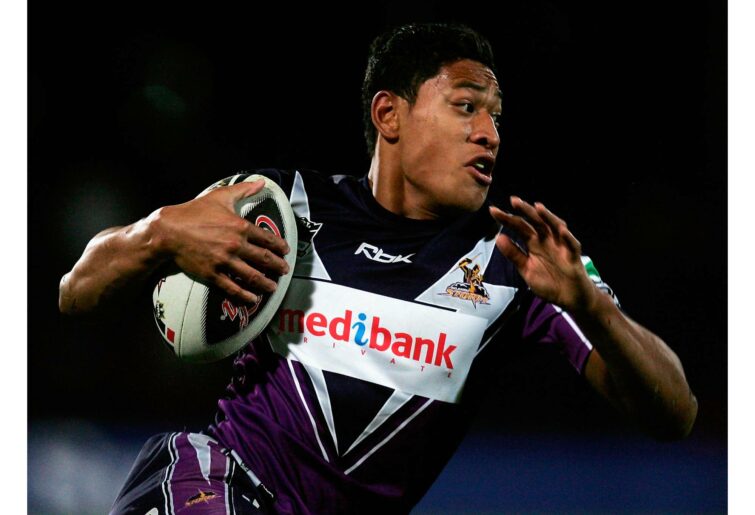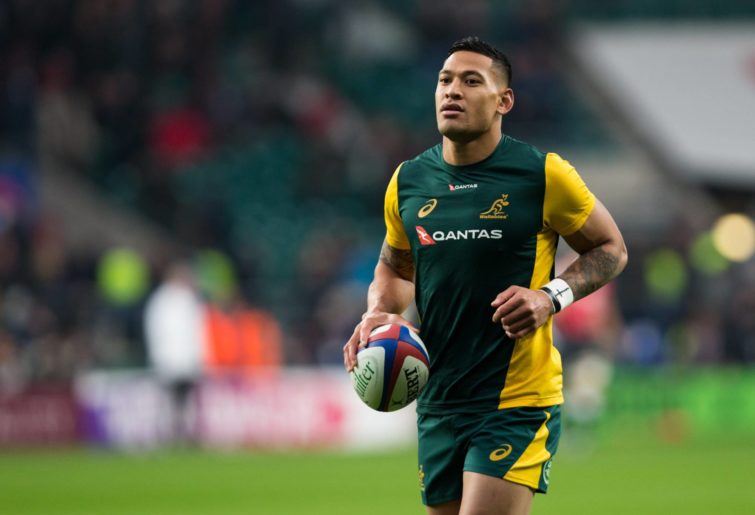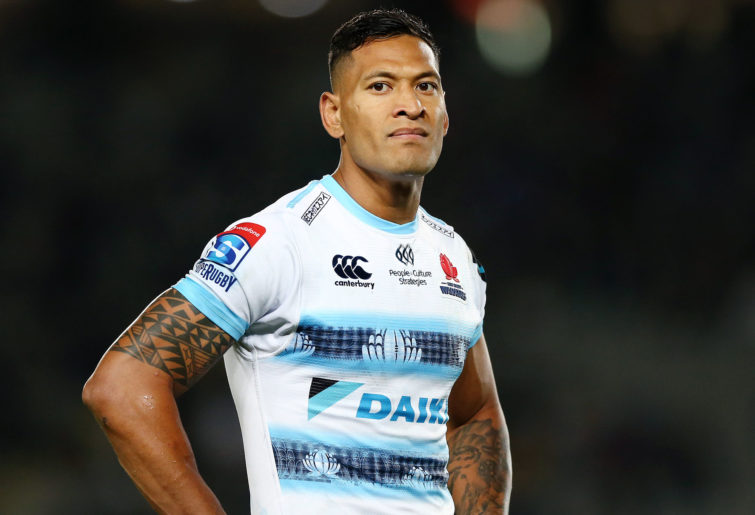The credits on Folau, the two-part documentary airing on the ABC this week and next, include a disclaimer making it clear that Israel Folau did not consent to the programme being made, or to the use of his words or image in it.
You can understand why: the doco features its fair share of harsh criticism of Folau. But the show is no hatchet job: if anyone comes away feeling rebuked by Folau, it should be those who believe the story of Israel Folau is a simple one, a matter of two sides: one good and one evil.
Maybe nobody will have their mind changed by the show: there’s surely never been a more divisive sportsperson in Australia than Folau, and most people’s positions were entrenched long before the documentary was made.
But the commitment of the producers to presenting a diversity of viewpoints, from a wide variety of people including former teammates and coaches, journalists, members of the gay and Pacific Islander communities, and church representatives, must be commended.
And though Folau was not interviewed for the programme, he is represented in old footage and interviews, and with words from his own writing – including this column from Athletes Voice.

Israel Folau in 2007. (Photo by Quinn Rooney/Getty Images)
The first thing that Folau does is remind us just what a phenomenal athlete Israel Folau was, and how thrilling it was to see him explode onto the scene: a giant teenager with size, speed, agility and a gravity-defying leap that made him near-unstoppable in the air.
But it also reminds us where he came from: a tight-knit Polynesian community in which family and faith come before all else. Those priorities explain a hell of a lot about Folau’s story: not just the controversy of the latter years, but his career decisions, including the shock move to the AFL.
There are those who believe Folau was treated disgracefully by Rugby Australia. There are those who believe it was Folau who treated RA – and his own teammates – in an unacceptable way.
Some will say that the administration had no right to sack a player for expressing his religious beliefs, while others will say he had no right to publicly spout bigotry and expect no consequences for it. Frankly, watching the saga play out on screen, it’s possible to see good arguments on both sides.
How did it get to this point? How did the biggest name in Australian rugby, the high-flying golden boy, become sport’s most hated pariah? How did the shy, respectful kid of those early NRL days become the country’s biggest publicity magnet?
Most of all, how did the man who was on record denouncing homophobia in rugby, who posed for the cover of a gay magazine to promote the gay rugby competition the Bingham Cup, end up as Australia’s most notorious homophobe?
The answer seems to lie in his religious journey. Raised in the Mormon church, by his own account Folau went off the rails as he struggled to deal with his sudden superstar status. Returning to his faith to find peace and stability, he found the Hillsong church, and then joined a breakaway sect led by his father Eni.
It seems to have been under the influence of Eni and his church that Folau began to be more publicly strident about his beliefs – including those concerning homosexuals and their destination “if they do not repent”.
Although his move to a more hardline denomination appears to have been the catalyst for Folau’s controversial pronouncements, it’s also deeply rooted in his upbringing in a community where God always came first. The primacy of religion runs deep in the people and places that Folau came from, to the extent that attacks on Folau’s beliefs, and his right to express them, were seen by many as attacks on the Islander community itself.
Islander teammates who supported Folau have expressed their own dissatisfaction with what they saw as discrimination and double standards from Rugby Australia.

(Photo by Craig Mercer/MB Media/Getty Images)
Last year’s “Manly Seven” controversy in the NRL further highlighted the conflict here: there are many players in both rugby codes whose beliefs align with Folau, and who will not surprisingly bristle at any attempt by administrators to tell them they’re not permitted to be open about those beliefs.
The beliefs about gay people are religious ones, but the bonds of the Pasifika community, and the inextricable linkage of faith and culture, means that attacking those beliefs inevitably opens up a wider battlefront than a dispute over biblical interpretation.
The fact that both the Folau affair and the Manly Seven palaver occurred in the context of the ultra-macho world of men’s football adds a further complicating factor to the argument. Homophobia has been a deeply-entrenched part of sporting culture from time immemorial: something that sporting bodies have lately been making efforts – of varying levels of enthusiasm and effectiveness – to redress.
The aggressively anti-gay attitudes that have long permeated the football world are still some distance from being eliminated – the emergence of public statements condemning gay people to hell from famous players is hardly helpful to this cause, even if condemnation on the basis of scripture comes from a very different place to the old-fashioned locker-room slurs.
There is a deep and possibly intractable dilemma at the heart of these controversies. Is it possible for any society to say that everyone is free to practise whatever religion they choose, while simultaneously saying that a person can be sacked for stating their religious beliefs out loud?
Does free speech exist if one’s livelihood is dependent on only making approved statements? Is there a line beyond which a public figure cannot be allowed to speak freely, if they are attacking a vulnerable segment of the community?
It highlights the difficulty that human beings have with accepting the existence of beliefs that are diametrically opposed to their own. To anyone who doesn’t hold the same beliefs as Israel Folau, it seems ridiculous that he can say he has no problem with gay people, that he loves them as he loves everyone, while also maintaining that they are going to Hell.
To anyone who does hold those beliefs, it seems ridiculous that anyone would find this ridiculous. It is incredibly difficult to defend someone’s right to free speech when you believe they are not only self-evidently wrong, but doing active harm to others with their statements.

Israel Folau. (Anthony Au-Yeung/Getty Images)
It’s incredibly difficult to accept that you should just shut up about your religion when you believe that speaking out is literally saving people from eternal damnation. Both sides are sincere in their conviction that giving in to the other would be horribly destructive. But somehow, both sides have to share this world together.
The Folau affair was seized on by people on both sides of the issue as an ideal vehicle to push their agendas. Israel Folau became a symbol on which to project whatever feelings you might have.
A martyr and a rallying point for some, a target for a fight against bigotry for others. For both sides, he was a handy focus for hatred and fury against the other.
The documentary rakes over the details of the contractual dispute between Folau and RA, the media frenzy, the different groups lining up for battle, and the wider political impact of the story: the government’s push to change discrimination law to protect religious institutions’ right to discriminate. One rugby player’s Instagram posts ended up reaching further than anyone could’ve foreseen.
It is a messy, complicated and still fiercely-disputed story. But the best summation of the whole thing comes right at the beginning of Folau, when journalist Georgina Robinson says, “When I look back on Israel Folau’s career in Australian rugby, I am sad.”
I don’t know how you could watch it and not be.
Folau will air on Thursday 18th and Thurs 25th May on ABC TV and ABC iView at 8pm AEST.































































































